Crossway Studies on the Trinitarian God (6 vols.)
Digital Logos Edition
Overview
The doctrine of God is one of the most important in all of Christian theology. This collection explores current and historical scholarship to give readers a thorough understanding of issues relating to doctrines of God, the Trinity, sovereignty and how they relate to Christian living.
It includes contributions from contemporary Reformed evangelical scholars such as Bruce A. Ware and Philip Graham Ryken as well as classic works from John Calvin and John Owen. In these volumes, readers will gain understanding on the background to current issues such as open theism, how God relates to time and the importance of the Trinity for both our understanding of God and our relationship with him.

Key Features
- Provides sophisticated treatments of God’s Trinitarian being
- Addresses the core questions and problems with understanding God’s character
- Connects the persons, nature, and concept of the Trinity to contemporary ethical and practical questions
Product Details
- Title: Crossway Studies on God and Trinity
- Publisher: Crossway
- Volumes: 6
- Pages: 1,568
- Christian Group: Evangelical
- Resource Type: Monographs
- Topic: Theology
Individual Titles
- The Deep Things of God: How the Trinity Changes Everything by Fred Sanders
- God Is Impassible and Impassioned: Toward a Theology of Divine Emotion by Rob Lister
- Our Triune God: Living in the Love of the Three-in-One by Philip Graham Ryken and Michael LeFebvre
- The Secret Providence of God by John Calvin
- Time and Eternity: Exploring God’s Relationship to Time by William Lane Craig
- Communion with the Triune God by John Owen
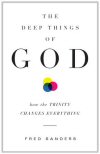
The doctrine of the Trinity is widely taught and believed by evangelicals, but rarely is it fully understood or celebrated. Systematic theologian Fred Sanders, in The Deep Things of God, shows why we ought to embrace the doctrine of the Trinity wholeheartedly and without reserve, as a central concern of evangelical theology.
Sanders demonstrates, with passion and conviction, that the doctrine of the Trinity is grounded in the gospel itself. Written accessibly, The Deep Things of God examines the centrality of the Trinity in our salvation and the Trinity’s presence in the reading of the Bible and prayer. Readers will understand that a robust doctrine of the Trinity has massive implications for their lives. Indeed, recognizing the work of the Trinity in the gospel changes everything, restoring depth to prayer, worship, Bible study, missions, tradition, and our understanding of Christianity’s fundamental doctrines.
At last, a practical guide to the most fundamental doctrine of them all. Mr Sanders shows us how the Trinity is the essential framework on which our faith is built, the hidden skeleton that gives shape and meaning to the flesh and blood of daily experience. Highly commended!
—Gerald Bray, research professor of divinity, history, and doctrine, Beeson Divinity School
Sanders has a gift for making the deep things of theology—in this case, the doctrine of the Trinity—clear and compelling rather than shallow and simplistic. This is as good an introduction to the essentially Trinitarian shape of evangelical faith and practice of which I’m aware. Every evangelical should be able to explain how the gospel is Trinitarian and the Trinity a summation of the gospel, and Sanders shows us how. He makes a convincing case that there is nothing wrong with the evangelical church in North American that a good dose of Trinitarian theology, if absorbed into the bloodstream of the body of Christ, could not cure. So take, drink, and prepare to be edified.
—Kevin J. Vanhoozer, research professor of systematic theology, Trinity Evangelical Divinity School
Fred Sanders’ book should be required reading for anyone involved in the work of the Gospel. It will help readers catch a fresh vision of the depths of the message they strive to proclaim and foster a renewed sense of the grandeur of the Christian life they invite people to enjoy.
—Mark Hopson, regional director, The California School Project
Fred Sanders is associate professor of theology at Biola University’s Torrey Honors Institute. A popular blogger and speaker, Sanders has authored numerous journal articles and written or contributed to several books, including Jesus in Trinitarian Perspective: An Introductory Christology, Wesley on the Christian Life, and coauthored Advancing Trinitarian Theology: Explorations in Constructive Dogmatics.
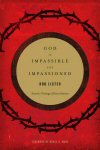
Gain fresh insights into the historical, biblical, and theological dimensions of the important doctrine of impassibility, exploring the significance of God’s emotional experience and most especially the question of divine suffering. Professor Rob Lister weaves together the history of the doctrine in the views of influential figures such as Augustine, Aquinas, and Luther, while carefully examining modernity’s growing rejection of impassibility and the subsequent evangelical response. This book gives the reader a model for holistic synthesis that takes into account both the biblical language of God’s emotions and the historical doctrine of impassibility.
Though a young and upcoming evangelical scholar, Rob Lister has made a very significant contribution to one of the most difficult theological doctrines, the impassibility of God. By combining historical theology, interaction with contemporary nonevangelical theories, a retroductive theological method, circumspect metaphysical reflection on divine revelation, biblical theology, and systematic theology (especially theology proper and christology), Lister offers a convincing case that God is both impassible and impassioned. This book sets the standard on this topic and is a model of evangelical scholarship at its finest!
—Gregg R. Allison, professor of Christian theology, The Southern Baptist Theological Seminary
Although the concept of divine passibilism, appropriate in some ways for a deeply sentimentalized culture, is all the rage in modern theology, for most of the history of the church, God was viewed as being impassible. Why was this so, and how did the Bible shape this perspective of God? And can we construct a model in this regard that does justice to what the Scriptures and church history say about God, and that also engages with modern sensibilities? This study by Rob Lister is extremely helpful in answering these questions: it is preeminently scriptural, takes the Rezeptionsgeschichte of this doctrine very seriously, and satisfactorily answers current concerns.
—Michael A.G. Haykin, professor of church history and biblical spirituality, The Southern Baptist Theological Seminary
Rob Lister boldly goes where few evangelicals have gone before in this very helpful study of how best to make sense of what Scripture says about God’s emotions. Lister does away with caricatures of the Patristic tradition as having sold out to Greek philosophy, surveys contemporary evangelical positions on divine impassibility, and provides a constructive hermeneutical method and theological model for doing justice both to the impassibilist tradition and to biblical language about divine emotions. As G. K. Chesterton observes, ‘an inch is everything when you’re balancing,’ and to Lister’s credit he completes his routine without falling off the balance beam that is systematic theology.
—Kevin J. Vanhoozer, research professor of systematic theology, Trinity Evangelical Divinity School
Rob Lister is associate professor of biblical and theological studies at the Talbot School of Theology. His primary research interests include theology proper, Christology, and sanctification—all of which are fused together at the hub of his book on divine impassibility.
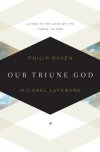
Discover the relevance and importance of the doctrine of the Trinity for everyday life. Authors Philip Ryken and Michael LeFebvre make the connection for readers between a doctrine to be believed and the reality that God is indeed tri-personal. Explaining roles and relationships within the Godhead while tackling difficult questions, Our Triune God offers a helpful guide into the paradoxical mystery of Father, Son, and Holy Spirit—the God of three-in-one.
Philip Ryken and Michael LeFebvre have written a delightful book that will help us to better understand the great truth of the Trinity; one God in three Persons. Better yet, it should cause us to grow in our appreciation of the distinct works of Father, Son, and Holy Spirit in our salvation and sanctification. I heartily commend this book.
—Jerry Bridges, author, The Pursuit of Holiness
The Westminster Shorter Catechism tells us that ’man’s chief end is to glorify God and enjoy him forever.’ In this book, the authors bring that affirmation to life by showing us that the Trinity is not just a doctrine to be believed but a relationship to be experienced and enjoyed. Pastors, teachers, and believers everywhere will be refreshed and challenged by this stirring call to a deeper participation in the love of the triune God.
—Gerald Bray, research professor of divinity, history, and doctrine, Beeson Divinity School
At a time when Biblical theology gets more attention among pastors, the twin advantages of systematic theology—namely that it will hold you to orthodoxy in the face of difficult Biblical texts and that it is organized according to the categories in which the non-Christian world speaks and thinks—cannot be underestimated. With this as backdrop, Ryken and LeFebvre’s Our Triune God fills a void in Christian literature. The chapters are formed as carefully reasoned expositions on the subject of the Trinity, and as such, this book provides us with a model worth emulating across the spectrum of systematic categories.
—David R. Helm, pastor, Holy Trinity Church, Chicago
Philip Graham Ryken is the eighth president of Wheaton College. Formerly, he served as senior minister of Philadelphia’s historic Tenth Presbyterian Church. He has written or edited more than 40 books and numerous commentaries, including Exodus: Saved for God’s Glory, Jeremiah and Lamentations: From Sorrow to Hope, and Reformed Expository Commentary: The Incarnation in the Gospels. He has lectured and preached at universities and seminaries worldwide.
Michael LeFebvre is pastor of Christ Church Reformed Presbyterian in Brownsburg, Indiana.
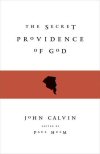
Rediscover Calvin’s fullest treatment on the important doctrine of the sovereignty of God that has been forgotten in recent decades. In 1558 John Calvin held a prominent position of leadership in the Reform movement. Reflecting the boisterous, argumentative tone of the Reformation era, The Secret Providence of God is Calvin’s answer to a critique of his position on divine providence, as articulated in the 1546 edition of the Institutes.
With this new English translation of Calvin’s work, editor Paul Helm reintroduces The Secret Providence of God to students, pastors, and lay readers of Reformed theology. Translator Keith Goad has modernized the English while preserving a Latinized translation style as far as possible. Helm has provided a full introduction, discussing the work’s background, content, style, and relation to Calvin’s other writings on providence.
Calvin’s treatise on the secret providence of God shows the Reformer at his theological best and polemically most acute. Like Luther before him, he demonstrates why the doctrine of divine sovereignty lies at the very heart of the Reformation, and why the doctrine is of such singular doctrinal, pastoral, and ecclesiastical importance. It is to be hoped that this new edition will introduce a new generation to Calvin’s thinking on this vital matter.
—Carl R. Trueman, professor of church history, Westminster Theological Seminary
Calvin’s robust defense of God’s providential rule of history is an excellent reminder of what was a vital concern for the French Reformer and also of his desire to be rigorously biblical and, as such, God-glorifying. Here is a pattern of theological reflection and method truly worthy of emulation.
—Michael A.G. Haykin, professor of church history and biblical spirituality, The Southern Baptist Theological Seminary
John Calvin (1509–1564) was a leading theologian of the Reformation, and known best for his Institutes of the Christian Religion (2 vols.). He also wrote a staggering amount of biblical commentary, covering almost every book of the Bible. It is known today as Calvin’s Commentaries (46 vols.).
Paul Helm is a teaching fellow at Regent College, Vancouver, where he was previously the J. I. Packer Professor of Philosophical Theology. Before going to Regent he was professor of history and philosophy of religion at King’s College in London. His books include Eternal God: A Study of God without Time, The Providence of God, Faith and Reason, and Faith, Form, and Fashion: Classical Reformed Theology and Its Postmodern Critics.
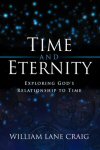
This remarkable work offers an analytical exploration of the nature of divine eternity and God’s relationship to time. Unravel the issues of divine complexity and omni-temporality, divine simplicity and immutability and divine temporality/atemporality. Written for the informed lay person, William Lane Craig’s book will inform the reader of current philosophy and scholarship into the nature of time with many suggestions for further reading.
William Lane Craig is research professor of philosophy at Talbot School of Theology in La Mirada, California. He has authored numerous books, including The Cosmological Argument from Plato to Leibniz, The Son Rises: Historical Evidence for the Resurrection of Jesus, and The Only Wise God: The Compatibility of Divine Foreknowledge and Human Freedom.
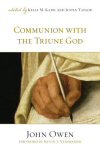
Does it make a difference that the God Christians claim to worship has revealed himself as triune-the Father, Son, and Holy Spirit? Does this fundamental truth of biblical authority have an effect on a believer’s personal fellowship with God?
Puritan theologian John Owen recognized the great need for every believer to understand the triune God. Communion with the Triune God revisits the truth presented by John Owen and challenges all believers to truly recognize and appreciate the ministry that God the Father, God the Son, and God the Holy Spirit have in their lives. This work of John Owen encourages Christians to enjoy true communion with each person of the triune God.
Here is a modern reader’s edition of a classic Puritan work by a classic Puritan author. It is a powerful Trinitarian profiling from Scripture of the truth that fellowship with God is and must ever be the inside story of the real Christian’s life. John Owen is a profound teacher on all aspects of spiritual life, and it is a joy to welcome this reappearance of one of his finest achievements.
—J.I. Packer, Board of Governors’ Professor of Theology, Regent College
Among English-speaking theologians and pastors, John Owen and Jonathan Edwards run neck and neck for the first place in profound, faithful, fruitful displays of the glory of God in the salvation of sinners. Not only that, they are both running for first among the ranks of those who show practically how that glory is experienced here and now. Owen may have the edge here. And Communion with the Triune God is his most extraordinary effort. No one else has laid open the paths of personal fellowship with the three persons of the Trinity the way Owen does. What an honor it would be to God if more of his children knew how to enjoy him the way Owen does.
—John Piper, chancellor, Bethlehem College and Seminary
For those who want to deepen their understanding of God’s greatness and how we walk with him, this book will repay, many times over, the effort its reading requires.
—David F. Wells, Distinguished Senior Research Professor, Gordon-Conwell Theological Seminary
John Owen (1616–1683) was vice chancellor of Oxford University and served as advisor and chaplain to Oliver Cromwell. Among the most learned and active of the Puritans in seventeenth-century Europe, he was an erudite and accomplished theologian both in doctrine and practical theology. Responsible for more than 20 highly influential theological treatises, and many of his works have been brought together in the The Works of John Owen (24 vols.).
Reviews
2 ratings

Daniel Caballero
2/1/2018
Johnnie Kirk
11/24/2017